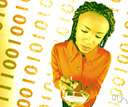ASCII
(ăs′kē)n. Computers
A standard for assigning numerical values to the set of letters in the Roman alphabet and typographic characters.
[A(merican) S(tandard) C(ode for) I(nformation) I(nterchange).]
American Heritage® Dictionary of the English Language, Fifth Edition. Copyright © 2016 by Houghton Mifflin Harcourt Publishing Company. Published by Houghton Mifflin Harcourt Publishing Company. All rights reserved.
ASCII
(ˈæskiː)n acronym for
(Computer Science) American standard code for information interchange: a computer code for representing alphanumeric characters
Collins English Dictionary – Complete and Unabridged, 12th Edition 2014 © HarperCollins Publishers 1991, 1994, 1998, 2000, 2003, 2006, 2007, 2009, 2011, 2014
ASCII
(ˈæs ki)n.
a standardized code in which characters are represented for computer storage and transmission by the numbers 0 through 127.
[1960–65; A(merican) S(tandard) C(ode for) I(nformation) I(nterchange)]
Random House Kernerman Webster's College Dictionary, © 2010 K Dictionaries Ltd. Copyright 2005, 1997, 1991 by Random House, Inc. All rights reserved.
ASCII
(ăs′kē) Computer Science
A code that assigns numbers to the letters of the alphabet, the digits 0 through 9, and punctuation marks. For example, the capital letter A is coded as 65. (In the binary number system used by computers, 65 is written 1000001.) By standardizing the code used in representing written text, ASCII enables computers to exchange information.
The American Heritage® Student Science Dictionary, Second Edition. Copyright © 2014 by Houghton Mifflin Harcourt Publishing Company. Published by Houghton Mifflin Harcourt Publishing Company. All rights reserved.
ASCII
(American Standard Code for Information Interchange). An eight-bit binary representation of letters and numbers.
Dictionary of Unfamiliar Words by Diagram Group Copyright © 2008 by Diagram Visual Information Limited
ThesaurusAntonymsRelated WordsSynonymsLegend:
| Noun | 1. |  ASCII - (computer science) a code for information exchange between computers made by different companies; a string of 7 binary digits represents each character; used in most microcomputers ASCII - (computer science) a code for information exchange between computers made by different companies; a string of 7 binary digits represents each character; used in most microcomputerscomputer science, computing - the branch of engineering science that studies (with the aid of computers) computable processes and structures computer code, code - (computer science) the symbolic arrangement of data or instructions in a computer program or the set of such instructions ASCII character - any member of the standard code for representing characters by binary numbers |
Based on WordNet 3.0, Farlex clipart collection. © 2003-2012 Princeton University, Farlex Inc.
Translations
ASCII
Collins Spanish Dictionary - Complete and Unabridged 8th Edition 2005 © William Collins Sons & Co. Ltd. 1971, 1988 © HarperCollins Publishers 1992, 1993, 1996, 1997, 2000, 2003, 2005
ASCII
[ˈæskiː] n abbr (=American Standard Code for Information Interchange) → ASCII ASCII fileASCII file n → fichier m ASCIIascorbic acid [æˈskɔːrbɪk] n → acide m ascorbiqueCollins English/French Electronic Resource. © HarperCollins Publishers 2005
ASCII
abbr of American Standard Code for Information Interchange → ASCII nt; ASCII file → ASCII-Datei fCollins German Dictionary – Complete and Unabridged 7th Edition 2005. © William Collins Sons & Co. Ltd. 1980 © HarperCollins Publishers 1991, 1997, 1999, 2004, 2005, 2007
ASCII
[ˈæskɪ] n abbr =American Standard Code for Information Interchange → ASCII mCollins Italian Dictionary 1st Edition © HarperCollins Publishers 1995